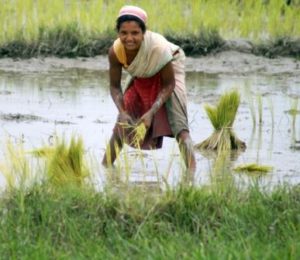
A team of researchers from Flinders University’s School of the Environment is helping the Government of Assam, a region in north-eastern India, to measure the wellbeing of its people.
Dr Udoy Saikia, Dr James Chalmers and Associate Professor Gour Dasvarma are members of the Technical Working Group of the Wellbeing Survey, working with development experts from the Indian Institute of Technology, Guwahati.
The resulting Assam Wellbeing Index will be combined with the United Nations Development Program’s Human Development Index (HDI) in the preparation of the 2014 Assam Human Development Report.
The project, led by Omeo Kumar Das Institute of Social Change and Development, an Assamese research organisation, will involve 800 interviewers reaching more than 40,000 households in all 27 districts in Assam.
Senior Lecturer and Associate Director of Applied Population Studies at Flinders, Dr Saikia said this was the first time in the world that an adaptation of Bhutan’s Gross National Happiness index would alongside the well-established HDI.
“The value of blending the two key indices is that it will improve the ability of policy-makers and analysts to understand and design remedial strategies to tackle multidimensional poverty,” Dr Saikia said.
“Crucially, this enables the targeting of particular human populations, such as the people who live in remote tea growing areas of Assam. The subjective qualify of life index would help to identify the precise dimensions of wellbeing where public resources should be put to work,” he said.
There are nine dimensions covered by the Wellbeing Index: standard of living, physical health, psychological and emotional health, education, culture, use of time, community vitality, environmental concern, and governance.
The wellbeing component of this project was formally inaugurated in December last year by the Honourable Chief Minister of Assam Tarun Gogoi who officially thanked Flinders University for taking the initiative in the Wellbeing survey.
The Chief Minister said the Wellbeing Index would be an integral part of the guide to measure the prosperity of the state, to bring in holistic changes in the state, and to help develop amity, peace, social order, as well as accelerate the economic growth.
The questionnaire for the fieldwork has been finalised and 200 leaders of the field staff are currently undergoing intensive training for the household interviews. The fieldwork will commence in the last week of March 2013 and is expected to take eight months for completion. The report will be ready by middle of 2014.


This is a fascinating looking project. This note is to let you know a group of us from Flinders and 3 other Universities are participating in a project in Patiala India looing at the issue of school violence. We begin our first visit to Patiala in April. Kind Regards
phillip slee
As I said before if all Indian women were given an excellent education and we were born with less melanin pigmentations with whiter skins we don’t need to be seen by researchers for our Indian well being. Basically in today’s world if you have the money everything is good and fine with your lifestyles. I hope God/ The Lord also see this and improve all Indian women so that they won’t be measuring Indian women as Indian women are born everywhere in this world as well…Amen!